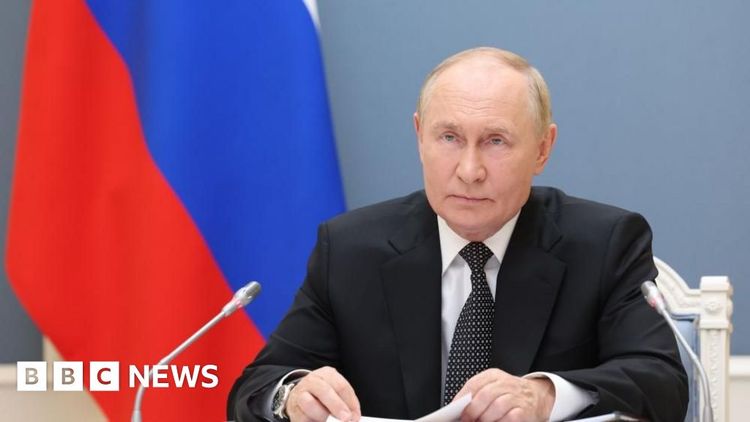Chris Mason: Joe Biden and Keir Starmer try to second guess Putin

In the hours leading up to the prime minister's motorcade ride to the White House, he and his team were situated in a secure area at the nearby British Embassy.
This room is specifically created for discussions that spies shouldn't be able to overhear, no matter how advanced their tools for listening in and capturing online communications may be.
The Downing Street team was in communication with British government officials in Ukraine and Russia, gathering information and preparing their strategy for the upcoming discussion with President Biden.
They got to the White House in the late afternoon, Washington time. The president took Sir Keir Starmer on a tour of the Rose Garden before they moved on to the Blue Room.
On either side of an elongated rectangular table, the two delegations sat opposite one another, with the prime minister and president flanked by seven colleagues each.
For a brief moment, we journalists were allowed to enter as well.
The leaders offered kind remarks, but soon after, there were loud inquiries and the journalists were quickly ushered out.
This was followed by a private discussion that lasted around 90 minutes.
Ukraine was the main focus, but it wasn't the only topic of concern. Other important issues, including the Middle East, China, and Iran, also demanded attention.
Downing Street aimed to present this as a chance for a more meaningful discussion, rather than just the typical back-and-forth of international summits.
But why worry about it when President Biden will soon be a thing of the past, leaving office and losing his power and influence in just four months?
I've been informed about the pressing nature of the matters at hand.
Consider Ukraine: a partner of both the UK and the US, which continues to require significant support as its allies deliberate on the most effective ways to assist and the potential implications of that assistance.
The UK has taken a proactive stance, as I was told in discussions aimed at persuading others to support Kyiv's plea to launch Western missiles into Russia.
President Biden has doubts and is concerned that it might lead to a direct confrontation between the United States and Europe with Moscow.
That's exactly what Vladimir Putin has been alluding to over the past few days.
However, his previous threats haven’t amounted to anything significant, so maybe this time it won’t either?
However, perhaps this time it actually could.
Diplomacy and intelligence are shifting focus to the mindset of a wartime leader, trying to anticipate how he may respond.
Could he genuinely consider launching a military strike against a NATO member country, which could dangerously escalate into a conflict involving the entire Western alliance and Russia?
And if not that, would Ukraine’s supporters tolerate milder forms of retaliation, like cyber attacks or sabotaging undersea communication cables?
There wasn't much hope that this meeting would settle the issue regarding western missiles, especially since additional talks with other parties at the United Nations are anticipated soon.
Later on, the prime minister remained tight-lipped about whether he had convinced the president to alter his decision.
This ongoing conflict shows no signs of resolution and raises numerous difficult questions. The central issue revolves around finding a way to overcome Russia without escalating tensions with Moscow.
What are the potential outcomes of taking action?
What might happen if we do nothing?
This has been at the core of the West's struggle ever since the large-scale invasion of Ukraine two and a half years ago.



























































